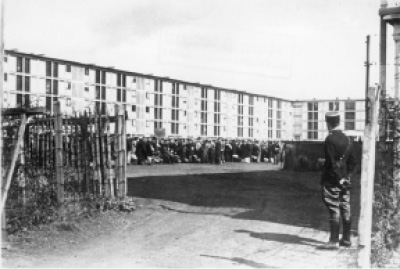Deportation
Deportation of German Jews to Polish ghettos began in October 1941, authorized and approved by Hitler. The coordination of deportations from wider Europe to both ghettos and camps was discussed at Wannsee. From the spring of 1942, transports carried Jews and other peoples whom the Nazis deemed subversive to the east with increasing regularity.
Since almost all Jews living in occupied countries had been registered, it was relatively straightforward for the Nazis to issue call-up notices for labour. Initially these summons targeted young people and immigrants, but they were soon issued more broadly, ordering Jews of all ages and backgrounds to report to a local assembly point. From here they would either be taken east immediately or interned temporarily before they were deported. Round-ups (also known as actions or razzias) took place both door-to-door and in public areas. Families and individuals were given just minutes to gather some possessions before being forced to leave their homes. The obligatory yellow star was often a facilitating factor in impromptu round-ups of Jews, and many people vanished from the streets without warning.
In the Netherlands, Jews were initially taken to the Westerbork transit camp before they were sent east. Westerbork was run like a small town, complete with an infirmary, shops and education facilities. Uninhabited council residences at Drancy, in the Paris suburbs, became the centre in which Jews were held before they were deported from France, while Jews and Roma living in Belgium were deported from Mechelen, also known as Malines. Conditions in these camps were far from idyllic, with substandard hygiene levels, but there was at least food and a chance to meet with friends and family. Some people died before they were deported, but systematic murder did not take place.

Drancy, August 1941
Bundesarchiv, Bild 183-B10919 / Wisch / CC-BY-SA
Sixty-five thousand Jews were ultimately deported from Drancy and over 100,000 from Westerbork, with the first transports leaving on 22 June 1942 and 15 July 1942 respectively. Twenty-eight trains also left Mechelen between 1942 and 1944, carrying over 25,000 Jews and Romani to labour and death camps. Deportations of Jews from Italy and Greece began in 1943 and Jewish communities in Czechoslovakia and Hungary were also among those subjected to round-ups and internment in holding camps before being forcibly removed from their homelands.
In Poland and Eastern Europe, the Nazis began liquidating the ghettos after Wannsee. Extermination centres had been strategically established in the vicinity of the biggest ghettos, with Treblinka sixty miles away from Warsaw and Chelmno thirty miles from Lodz. The Judenräte were asked to provide lists of Jews to go on each transport, always under the auspices that they were being resettled for labour. The majority of Jews deported to the camps, whether from wider Europe or from the ghettos, were transported by train. They were treated as freight, forced in to cattle trucks rather than seated in carriages designed for human passengers.
Often described as the journey of nightmares, some of those who were pushed on to the deportation trains did not survive the journey. Upwards of seventy people would be crammed into a single cattle truck, bolted from the outside, with no food except any small provisions they might have hidden on their person beforehand. The huge numbers of humans in a tight, barely ventilated space made it hard to breathe and many suffocated before the doors were opened again. There was no humane way of going to the toilet and no possibility of sitting or lying down. It is estimated that the average space in which each deportee could stand was no larger than a twenty-five-centimetre square.
From the spring of 1942 until late 1944, these death trains transported Jews from all over Europe to camps in Poland, Germany, Austria and Czechoslovakia. Some journeys lasted more than three days and nights, without any relief for the prisoners on board. When the doors were finally unbolted, those who were still alive realized that their descent into Hell had barely begun.